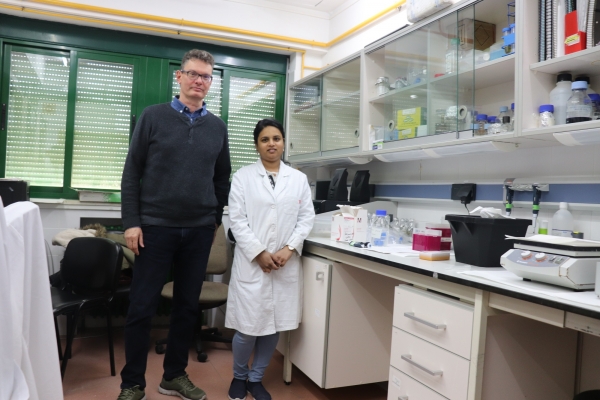Some estimates calculate that on Earth there are some one nonillion microbes; that is, a 1 followed by 30 zeros. Some of them provoke serious diseases in a wide range of organisms. Others, in contrast, are responsible for protecting them and guaranteeing their survival. The microbio¬me is the set of microbes that contribute to the health and well-being of their hosts. Currently we know that the microbiome constitutes a fundamental part of the plant's defen¬se system, although its mode of ac¬tion is still poorly understood.
The Marie Curie research project Direction was recently initiated at the the group Molecu¬lar Genetics of Fungal Pathogenicity at the University of Cor¬doba, with the aim of analysing the mi¬crobes that make up the defensive barrier in tomato plants. The long-term goal, ac¬cording to Antonio Di Pietro, a Professor of Genetics and leader of this research, is to develop a synthetic microbiome using the main mi¬croorganisms that compose it, in order to strengthen the plant’s natural defence systems.
Tomato, like many other crops, is affec¬ted by different pathogens, among them Fusarium oxysporum, a fungus with a high adaptive capacity that attacks more than100 different crop species, colonising their vas¬cular systems. In order to address this pro¬blem, the group has obtained different samples of soil from tomato-growing areas in Cordoba, and has already isolated hundreds of microorganisms that make up the microbiome, both in the plant root and in the rhizosphere – the part of the soil immediately adjacent to the roots. Many of microbes have already been identified at the species level through genetic sequencing.
The key to the project, whose beneficiary is the researcher Dr. Mugdha Sabale, is to select those microorganisms that are dominant in the tomato microbiome and that play a leading role in the defen¬ce of the plant, and use them to create an artificial microbiome, a kind of probiotic that enhances the plant’s health. The pro¬duct could be applied when planting the seed, or added with a substrate to the soil to help the natural microbiome to perform its protective functions, for example, compete with pathogens for space and nutrients, or even attacking them through production of antifungal compounds, in addition to helping plants grow and assimilate the nutrients from the soil.
According to Di Pietro, pathogenic fun¬gi alone destroy 15% of all crops worldwide each year, inflicting millions in financial losses. If the product proves effective, it could represent a breakthrough in the fi¬ght against these harmful microorganisms, by means of a system that would allow to reduce the use of pesticides and their negative en-vironmental consequences


